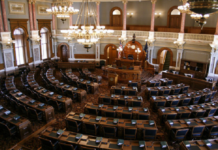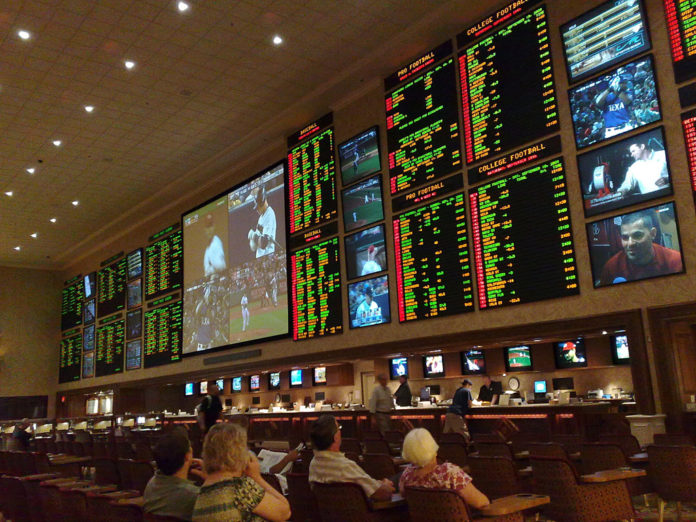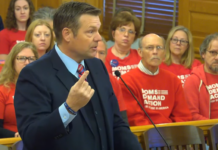Sports wagering was dealt a serious setback Tuesday when the Kansas House voted down a broad bill that would have allowed betting at four state casinos and 1,200 lottery retailers statewide.
The House voted down a bill that appeared to collapse under its own weight because of its breadth, which called not only for sports wagering but a revote on allowing slot machines at a defunct dog track in Sedgwick County.
“There were just too many folks that wanted different things,” said House Speaker Ron Ryckman Jr. “There are so many conflicting opinions.”
There were a number of issues at play, he said, including whether the lottery should run sports wagering, how many outlets should offer sports betting and the latest issue of slot machines at race tracks.
There were questions about whether authorizing an election for slot machines in Sedgwick County would violate the state’s noncompete clause with the casinos.
The 2007 law authorizing casinos in Kansas bars expansion of gambling in other areas of the state until 2032.
If the state was found to be in violation of the law, it could mean it would have to pay millions back to the casinos that have already paid privilege fees to operate in Kansas, plus years of interest.
Five years ago, Kansas Attorney General Derek Schmidt issued an opinion saying that allowing a revote on Greyhound Park in Wichita may breach the state’s contract with the Kansas Star casino south of Wichita in Mulvane.
Schmidt wrote that allowing a revote would potentially give the Mulvane casino cause to demand repayment of its privilege fee or other damages.
Two years ago, the Sedgwick County Commission refused to put the issue on the ballot, saying that was the authority of state lawmakers.
Commissioners expressed concern that the election could have made the county and state vulnerable to lawsuits because it could have violated the state’s noncompete agreements with its four casinos.
The bill provided a means for seeking a ruling from the state Supreme Court on whether expanding gambling in Wichita would violate the state’s noncompete agreement with the casinos before any new contracts were signed.
But Republican state Rep. Brad Ralph of Dodge City questioned the wisdsom of breaking a contract for the purpose of testing a case in the courts.
He said it made no sense for the state to intentionally breach the agreement it has with the casinos while ignoring the advice of its attorney general.
Ralph said the bill sent a bad message for businesses that want to deal with Kansas if it has a reputation of not honoring its contracts.
“We as a Legislature should not intentionally incur legal liability for breaches of contract,” Ralph said.
“It’s unwise. It’s imprudent. It’s costly beyond calculation and its presents an additional unknown consequence that we ought not sign onto,” he said.
The House and the Senate were already headed on a collision course over sports wagering by the time of Tuesday’s night vote.
There were deep differences between their two approaches, including where sports wagering should be allowed, how much it should be taxed and whether the state should be a bookmaker.
The House bill took a much broader approach by offering sports wagering at 1,200 lottery retail outlets across the state, which casino executives say would give Kansas more locations to gamble on sports than any state in the country.
Unlike the Senate, the House bill authorized the Kansas Lottery to operate sports wagering through one or more interactive sports wagering platforms.
The House bill awould tax online sports betting revenues at 20% and in-person betting at a casinos at 14%.
The Senate bill, meanwhile, collects 5.5% from sports bets placed in person at a casino and 8% of from bets placed online.
Republican state Sen. Jeff Longbine of Emporia said it was hard to gauge where sports wagering goes now as time in the legislative session wisps away.
“I don’t know what direction the House goes from here,” said Longbine, who sponsored the bill in the Senate.
“Do they come toward the Senate position and try to keep some of their components in the bill?
“Or do they just go completely the other way and not even consider sports betting?”
Ryckman said he was confident that Kansans would signal whether they want sports wagering.
“We’ll see if the people of the state still want sports betting,” he said. “If they do, they’ll let us know.”
The casinos had opposed the House legislation and were pleased to see it defeated on Tuesday night.
“We are pleased that the House voted down the amended version of SB 84,” said Jeff Morris, vice president of public affairs and government relations for Penn National Gaming, which operates the Hollywood Casino in Kansas City.
“We continue to support the Senate version which was modeled after the most successful sports betting frameworks across the 25 states that already accept legal bets, including Iowa and Colorado,” Morris said.
“Hopefully the original language will be considered in the House and Kansans get the opportunity to wager legally by the start of football season.
















